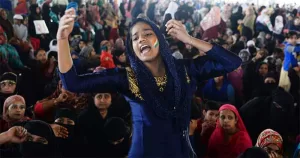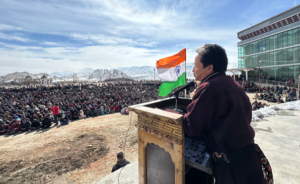❈ ❈ ❈
Sankha Ghosh: A Poet and Face Beyond Advertisements
Uttaran Das Gupta
Bengali poet and novelist Sunil Gangopadhyay recalled collecting poems of his contemporary Sankha Ghosh for the inaugural edition of the legendary little magazine Krittibas in 1953. “The most discussed young poet in those days was Sankha Ghosh,” wrote Gangopadhyay in his autobiography Ardhek Jibon (Half a Life, Ananda Publishers, Calcutta, 2002):
“Narayan Gangopadhyay [novelist] had read his [Ghosh’s] poetry to his students in the Bengali class at City College. We were also enamoured after reading his poetry in Parichay. We must have his poems. And we were delighted to get our hand on an entire notebook of Shankha Ghosh’s poetry. His handwriting was like pearls, and each poem shone like a diamond. Perhaps, it was in this notebook that he was putting together his first anthology. The first page only had the word: “Shri”. We took the longest poem, “Dinguli Raatguli” (The Days and the Nights). It was the first poem of the first edition.”
Krittibas, named after the medieval poet credited with translating the Ramayana into Bengali, became the magazine of the first post-independence generation of poets in Calcutta (Kolkata). It provided a home to many others such as Shakti Chattopadhyay, Sandipan Chattopadhyay, Alokeranjan Dasgupta, Binoy Majumdar and Samir Roychoudhury. After Dasgupta’s demise in November 2020, Ghosh was the last living major poet of this generation.
Ghosh, 89, passed away on April 21 at his home in Kolkata, where had been in isolation after testing positive for COVID-19, reported the Indian Express. He is survived by wife Pratima and daughters Semanti and Srabanti. He had been hospitalised previously after being detected with comorbidities, but chose to stay in home isolation this time. While West Bengali chief minister Mamata Banerjee expressed her condolences, Prime Minister Narendra Modi also tweeted about it. India reported 295,158 new COVID-19 cases on April 22, and 2,023 deaths even as it continued to fight a raging second wave.
Born at Chandpur in present-day Bangladesh on February 6, 1932, Ghosh’s family moved to India during Partition. He studied Bengali literature, earning a BA from Presidency College in 1951 and an MA from Calcutta University in 1954. He taught for decades at Calcutta University and at Jadavpur University, Kolkata, and was also at the University of Iowa’s famed writers’ residency in 1967. He was given the Sahitya Akademi award in 1977 for his book Babarer Prarthana (Babar’s Prayer) and in 1999 for the translation of Girish Karnad’s Kannada play Taledanda. He was also honoured with the Padma Bhushan by the Government of India in 2011 and the Jnanpith Award in 2016.
Bengali poet Subodh Sarkar told PTI: “He was soft-spoken but his pen was razor-sharp, always speaking against intolerance. He used to be a participant in all conventions and movements for free and liberal thinking.”
Never one to shy away from taking a public position, Ghosh had spoken out — despite his own leftist politics — against the erstwhile Left Front government of West Bengal after violence in Nandigram and Singur in 2007 over land acquisition for factories. He has also been vocal against the arrest of a Jadavpur University professor in 2011 for allegedly lampooning Mamata Banerjee.
From early on, Ghosh’s lyrical poetry was self-consciously political. One of his earliest poems, “Jamunabati”, begins:
Nibhonto ei chullitey Ma
ektu agun de
Arektu kal bnechei thaki
bnachar anandey!
(Give some fire mother
in these extinguishing embers
Let me live a little more
in joy of living!)
In his essay ‘Kobitar Muhurto‘ (Moments of Poetry, Anushtup, Kolkata, 1987), Ghosh recalls that he was inspired to write this poem after reading in the newspapers about the death of a 16-year-old girl in police firing in the Cooch Behar district of north Bengal. The girl was part of a demonstration to demand for cheaper food grains. “Four years had passed since Independence,” writes Ghosh, “people have got this news, but they have not got food.”
Ghosh also recalls that poet Buddhadeva Basu dismissed “Jamunabati” as a “tormented howl” not fit to qualify as a poem at a literary conference in 1953, but it had continued to be popular.
In an interview with Nirmal Kanti Bhattacharjee in 2017, Ghosh said: “When I started writing poetry, there was an overdose of what is known as ‘poetic language’ in my writing… Many readers liked it also. Then something happened — I became tired of reading a lot of poetry happening around… That is when a reaction started forming inside me against the ‘poetic language’. I started writing short poems with the language of people’s daily intercourse.”
Perhaps the most famous example of this style is the titular poem of his 1984 anthology My Face is Covered with Advertisements (Ananda Publishers, Calcutta):
Ekla hoye dariye achi
tomar jyono golir koney
bhabi amar mukh dekhabo
mukh dheke jaye bigyaponey
Ekta duto sahaj kotha
bolbo bhabi chokher aare
joulushe ta jholshe othey
bigyaponey, ronbahare
(Alone I wait
for you in the lane
to show you my face
my face is covered in advertisements.
A few simple words
to tell you, privately
but these are illuminated
with advertisements, neon light)
This poem, an example of Ghosh’s late style, is in fact a tormented howl against the commercialisation of even our most private thoughts and feelings.
Besides poetry, Ghosh was also a renowned scholar and an authority on Rabindranath Tagore, often intervening in public debates about the Nobel Laureate’s works and legacy. In 2018, when news emerged about the “discovery” of a new Tagore song, Ghosh did a fact check. He told The Hindu that the song in question, “There Are Numerous Strings in a Lute”, had been published previously in Tagore’s 1918 collection, Crossing.
But Tagore was not only a matter of history and heritage for Ghosh — the poetry and the life of the poet had significant resonance with contemporary events. In ‘Kobitar Muhurto’, he recalls organising an exhibition for Tagore’s 125th birth anniversary in 1986 and finding new information about his political activities:
“Everyone knows about Tagore’s protest against the Jallianwala Bagh atrocity and that the next year (1920), he had left London for Paris after hearing the government’s position on the massacre in the parliament. But, I didn’t know that in Paris Tagore made a public speech against this British barbarism. I didn’t know that a few months later, in America, Tagore called the Non-Cooperation Movement India’s uprising against the British. …I was wondering how to make the exhibition relevant when news arrived — not from Punjab but from Bihar. Police had shot dead 23 farmers over a land dispute in Arwal.”
Throughout his decades-long career, Ghosh fed the embers of his poetry and erudition with the fire of his convictions. His work is also likely to resonate with politically committed poets and scholars of future generations.
(Uttaran Das Gupta’s novel Ritual was published last year; he teaches at O.P. Jindal Global University, Sonipat. Article courtesy: The Wire.)
❈ ❈ ❈
Remembering Sankha Ghosh and His Timeless Poetry
Manash Firaq Bhattacharjee
The Bengali poet, Sankha Ghosh (February 5, 1932–April 21, 2021), who was born in erstwhile East Bengal, passed away in Kolkata at the age of 89, due to COVID-19-related complications. In an article written in Ananda Bazar Patrika this January, the poet Joy Goswami paid tributes to Ghosh for developing his taste and for teaching him the virtue of baring oneself in poetry, since the age of 26 when he bought his first book.
Reading his poems in Bengali, one is immediately struck by the delicate voice, making its way through ironies. In April 2018, Ghosh walked along with other poets and theatre artists to protest against communal violence during Ram Navami celebrations.
In another pubic rally he attended on June 21, 2013, Ghosh referred to Rabindranath Tagore’s part in public protests during the first partition of Bengal and the Jallianwala Bagh Massacre, as part of the legacy of Bengal’s political culture. Ghosh was awarded the Jnanpith Award in 2016 and the Padma Bhushan in 2011.
Here are three of his poems, translated from the Bengali original:
Holiday
Maybe, it had come. I did not see anything.
Now, has it gone too far away?
I shall go. I shall go. I shall go.
Everything is set. Now, there is only
Leave-taking,
Eyes on everyone,
In the moment of parting, I bow, I bow.
Your name?
I do not have a name as such, two boats
Moored together,
Far away, everyone has cast their nets in the sea.
Shut up, be Wordless
Why do you talk so much? Shut up,
Be wordless
At the root, encircle the murmur of caresses
Write ageing, write ageing
The tamarisk tree, the elevation of sand, breaks down,
The wind flies,
Below your eyes, the universe of my eyes
Wakes up
Beneath the currents, a whirlpool, beneath the whirlpool, stillness,
Write ageing,
Write ageing, write ageing
Shut up, be wordless.
Feathers
By everything it erases, this night is your equal.
All wounded faces, silted. Sometimes
Near or far, the phosphorus lights up. Nothing, nowhere
Has peace. The waves flow, just like you
All alone, like you, so unconcerned.
Whenever I think of you, all the wounds
Like feathers, place their hands on the heart,
Even though I know you never desired me.
[Manash Firaq Bhattacharjee is the author of The Town Slowly Empties: On Life and Culture during Lockdown (Headpress, Copper Coin, 2021), Looking for the Nation: Towards Another Idea of India (Speaking Tiger, 2018), and Ghalib’s Tomb and Other Poems (The London Magazine, 2013). All translations are by the author. Courtesy: The Wire.]




